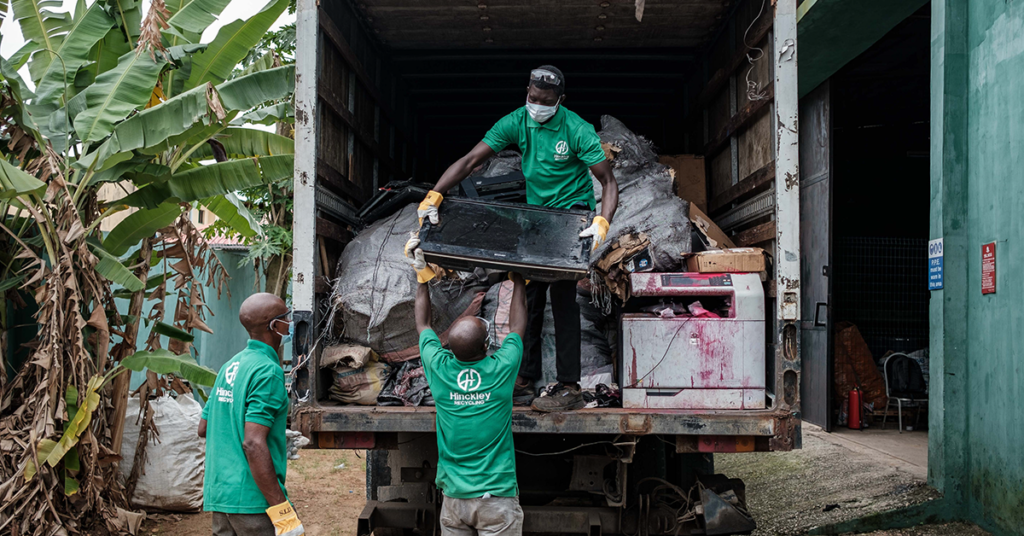Less is more: MMD successfully completes pilot project for sustainable reduction of monitor waste
Amsterdam – 16 February 2023 – And it does work: MMD, a leading technology company and brand licensing partner for Philips monitors, demonstrates in Nigeria how defective monitors can be recycled in an environmentally friendly and economical way as part of a pilot project of the PREVENT Waste Alliance, an initiative of the German Federal Ministry for Economic Cooperation and Development (BMZ). Other associates significantly involved in the project are: Closing the Loop, a global provider of green procurement services, TCO Development, the organisation behind the world’s leading IT sustainability certification TCO Certified, and other partners. Together with them, MMD has developed a successful business model on how to extend a certified solution for waste-neutral electronics also to monitors, setting new standards for green procurement.

The challenge of e-waste
50 million tonnes per year: electronic waste (e-waste) is one of the most urgent challenges facing our society today. According to a report by the Platform for Accelerating the Circular Economy (PACE) and the UN E-Waste Coalition1, this mountain of waste is mostly disposed of by ship to African or other emerging countries.
But even though almost all new Philips monitors are mercury and lead-free, computer monitors, with their very small built-in circuit boards and burnt-in chemicals such as lead and mercury, are generally considered the problem child of recycling and the circular economy. At least in Africa, a large part of them cannot be properly recycled due to a lack of suitable facilities and resources. This is because there is no money to be made from proper recycling and collection so far.

Extending the successful model of waste compensation
A proven successful approach to mitigating and addressing this gigantic challenge is the concept of e-waste compensation, which is already recognised in public procurement as a green solution for mobile phones, laptops and tablets and closes the loop of the life cycle of electronic equipment. A fee added to the purchase price of new electronic equipment finances the collection of old equipment for safe recycling. The raw materials recovered in this way are then reused in the manufacture of new products, making them waste neutral.
As part of its commitment to more sustainable monitor technologies, Philips monitors has supported Closing the Loop and a coalition of transnational partners – such as the Öko-Institut e. V. research institute and local Nigerian partners Verde Impacto, Hinckley Recycling and SRADev Nigeria – for a year and a half to build a business model that demonstrates how the waste compensation programme can be extended to monitor waste and the TCO Certified Edge, E-waste Compensated certification. Over 5,500 monitors that were no longer usable were collected by the partners for the project.
“We are pleased to have been able to develop a business model with this pilot project that proves that the successful concept of waste compensation not only works for mobile phones but can also make the much more challenging recycling of monitors financially lucrative while contributing to the development of local recycling capacities,” says Stefan van Sabben, Global CSR and Sustainability Senior Manager at MMD, Philips Monitors.

First successes on the way to the circular economy
At the beginning of the project, there was hardly any experience with the recycling of flat screens in Nigeria. Discarded monitors were piling up in landfills, posing a considerable risk to people and the environment. The recycling partner was therefore first trained in the manual dismantling of flat screens. This included the safe removal of the mercury-containing black light tubes, the safe dismantling of all other electronic components, and the identification and separation of the different types of plastics, including those containing hazardous brominated flame retardants.
At the end of the project, the recycler was able to dismantle flat panel displays in a very safe and efficient way, reducing the costs required to do so by more than half and returning raw materials to the cycle. Although the road is still long, these are encouraging first steps towards a truly sustainable future.
Pilot project page: click here.
This project is funded by the PREVENT Waste Alliance, an initiative of the German Federal Ministry for Economic Cooperation and Development (BMZ). More information: click here.
Learn more about Philips monitors’ green monitors: click here.
